- About
- Programmes Offered
- Staff
- Syllabus
- Vision
- Mission
- Program Educational Objectives( PEOS)
- Laboratories
- Skill Development Centers
Mechanical Engineering Department
Mechanical Engineering is an old field. Its name derives from the Latin machine, which means invention or trick. The first machines such as the wheel and the needle with an eye date back to the stone age, but the term engine, adapted from the Latin ingenious, natural ability, had by the time of the late Roman Empire become associated with invention, and eventually, with a skilled machine - the engine. The sense of magic prevailed in engineering for much of the pre-industrial age (Newton's writing reveals his work to be in the traditions of alchemy). Today, mechanical engineering denotes a broad field that has to do with the generation and transmission of mechanical energy. Since this motive energy is often derived from heat, much of the work of mechanical engineers involves thermal energy. Similarly, since these processes need to be housed and the energy transmitted, mechanical engineering is also concerned with the structures in which such devices are housed, and with how they work and fail - mechanics, which is closely related with the process of deciding how to put these devices together - the act of design. Finally, it is necessary to evolve processes by which these devices are to be constructed, which leads to the science of manufacturing. In addition to these tasks, the trend towards greater quality has seen a gradual move towards integration with sensors and automation, leading to the modern science of robotics (the word, related to a slavic word for bonded labour or serf and cognate to the Sanskrit arbhas, weak child, is barely seventy years old).
Mechanical Engineering at SRKIT
The current streams of study in Mechanical Engineering at SRK Institute of Technology reflect the curriculum designed by Board of Studies of JNTU Kakinada..Within each area, the department combines strengths in the traditional as well as the modern. Since 2011, the department has felt that engineering education should be oriented towards design. Integrating various aspects of the field in order to create a solution to a problem, i.e., a synthesis has been the main focus. The current undergraduate curriculum emphasizes this through a sequence of seven departmental courses (including a two semester project) and two first year course in Engineering Mechanics and Engineering Drawing. This is complemented by a set of courses focused on the basics, and a series of broad-based electives. In contrast, the emphasis in the graduate curriculum has been on more advanced topics, and over the years, students have gained increasing freedom to opt for different electives. The total course requirement has also been reduced in the interests of a better quality thesis. Each year, the department graduates 120 B.Tech.s,. The faculty strength is currently 24. Past and Present The Mechanical Engineering Department at SRK Institute of Technology played a role model for many engineering institutes in Vijayawada as the Management belongs to the Industrialist Background. Today, the world of mechanical engineering at large is facing dramatic changes under the influence of advanced computational tools, vastly improved simulation and analysis, and entirely different manufacturing protocols.
One of the strengths of the department has been its strong outreach.. The bonds with industry and the outside world are often reflected in the classroom, sometimes as external speakers, and sometimes through the industrial insights gained by faculty and students. One of our difficulties, as in many other areas of the department, has been the challenge of finding energetic young faculty to drive these engines of growth. The Future In the coming years, unlike in the past, the effectiveness of the undergraduate program will be increasingly gauged by the quality and extent of its service to the technological needs of the nation, and we see the mechanical engineering department moving strongly in this direction. New materials, such as plastics, resins, and embedded sensor materials are being introduced into the curriculum. Thus, it is hoped that the department will emerge into the dawn of the newly liberalized era a much stronger and re-vitalized force. At the same time, the technology available to a mechanical engineer is changing. Metal is being replaced by plastic, dull grey by brightly splashed colour. Driven by superior analysis, the designs are undergoing deeper, functional change. The resulting devices are emerging increasingly sleek and sophisticated, the tremendous complexity of design hidden under the fabric of simplicity of use. Looking at the machines of today, the day is surely not too far off when mechanical machinery will be viewed at par with the simplicity of perfection inherent in the sailing ship and the violin. CENTRAL FACILITY One of the missions of SRKIT is technology outreach to Indian industries. The Computer Integrated Manufacturing (CIM) Laboratory has been successful in achieving this objective by bringing together under one roof all tools of product design and prototyping DIRECTIONS brings you a brief report on the vision and growth of the CIM Laboratory at SRKIT.
| Under Graduate | Intake |
|---|---|
| B.Tech( Mechanical Engineering) | 60 |
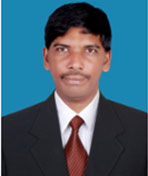
Faculty Name : Dr. P. KISHORE KUMAR
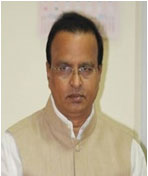
Faculty Name : Dr.T S S BALAJI

Faculty Name : Mr. BALA CHINALINGAM VANANM
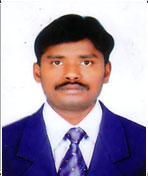
Faculty Name : Mr. D ROGNATHA RAO
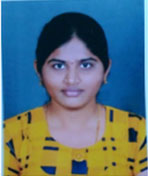
Faculty Name : Ms. P.BHAGYA LAKSHMI
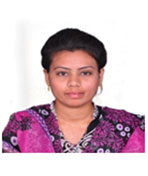
Faculty Name : Ms. Y.DURGA BHAVANI
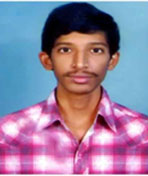
Faculty Name : Mr. R. KARUN KUMAR
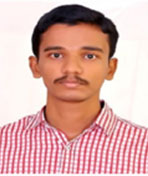
Faculty Name :Mr. R. KIRAN KUMAR
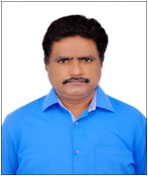
Faculty Name : Dr. ANDE STANLY KUMAR
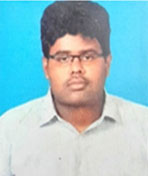
Faculty Name : Mr. U.TANOJ
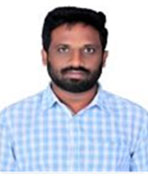
Faculty Name : Mr. P. TARUN NAGA VENKATESH
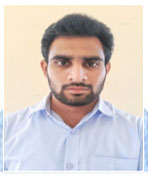
Faculty Name :Mr. HARI KRISHNA MUSUNURU
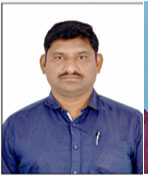
Faculty Name :Mr. RAMAVATHU MURALI
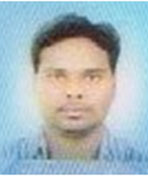
Faculty Name : Mr. PIDATALA MUTHAYYA
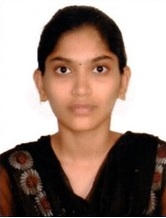
Faculty Name : Ms. D. HARITHA BRAHMA
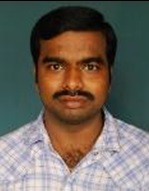
Faculty Name : Mr. ANANTA BHASKARARAO
PROGRAM EDUCATIONAL OBJECTIVES (PEOs)
PEO 1:
: To apply engineering principles to develop products, processes or knowledge to solve mechanical and associated engineering problems for successful career in mechanical engineering and allied fields.
PEO 2:
To inculcate entrepreneurial culture and foster research activities through industrial collaborations.
PEO 3:
To nurture effective communication and interpersonal skills to demonstrate leadership qualities, and exhibit professional ethics.
PROGRAM SPECIFIC OUTCOMES (PSOs)
PSO 1:
: Analyze, design and develop mechanical components to solve engineering problems in design and manufacturing domains.
PSO 2:
Formulate, analyze and develop thermal systems to solve complex engineering problems using modern technological tools.
CAD/CAM Lab
The applications of computers are more and more popular in modern industry and business. Computer-Aided-Design (CAD) and Computer-Aided-Manufacturing (CAM) were developed in order to shorten the process of designing and manufacturing. The main objective of this laboratory is to provide the undergraduate and graduate students with the knowledge and techniques of the research and application of CAD.
The modern manufacturing methods are very important in order to reduce costs and to maintain high precisions. The efficient CAM environment will provide the industries fore front.
The CAM Lab aims to support Teaching & Research in the areas of intelligent manufacturing. The lab provides advanced manufacturing environment which fit the modern Industry requirements. Advanced Manufacturing Equipments, including CNC Turning centre , CNC Milling centre and Robot Arm are provided for practice.
The students will be practiced the cycles with the high-fi lab environment. The demonstration of 5-Axis pick and place Robot arm brings the students into the new environment of innovative ideas.
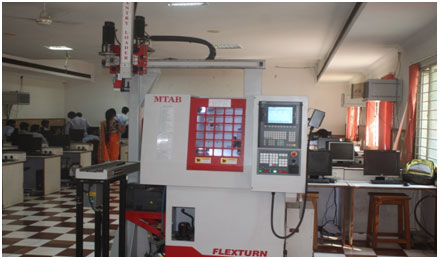
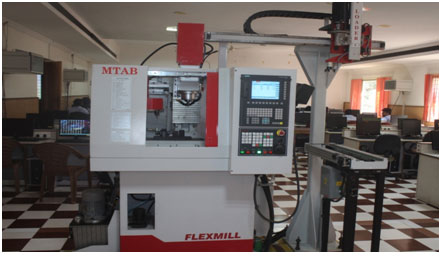
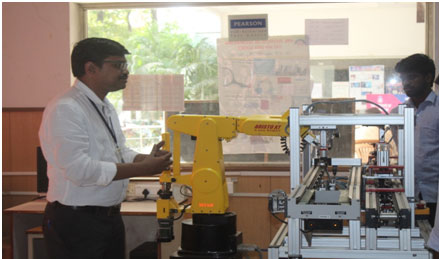
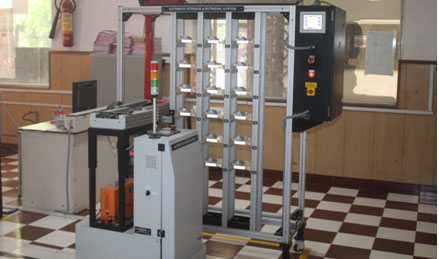
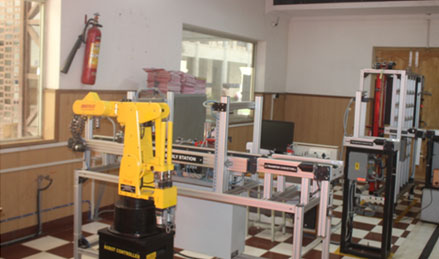
The department has a well established computer centre with more than 100 systems with all the latest CAD/CAM software. The department has computational facilities to carry out the laboratory and undergraduate level coursework. Mechanical Engineering department also has Various software's such as CATIA, ANSYS, AUTOCAD, ANSYS etc. have been installed on different computers in the department and are now available on local servers of Institute's Computer Center. Moreover most of the conventional machines and laboratory equipments in the department are connected to individual computers for carrying out computational analysis of the result
MACHINE TOOLS LAB
The students are required to understand the parts of various machine tools and operate them. They are required to understand the different shapes of products that can be produced on these machine tools. The machining area is very vast in the area of research. The lab facilities provided here can give very keen practical observations in the area of manufacturing that can be applied for the manufacturing of simple components, different types of tools, gears by using different materials. The each topic covered in the curriculum is well explained with the support of machines. The practical knowledge on lathe, milling, grinding, drilling, shaping, planar machines provides wide opportunities to the students for the familiarization of industrial applications.
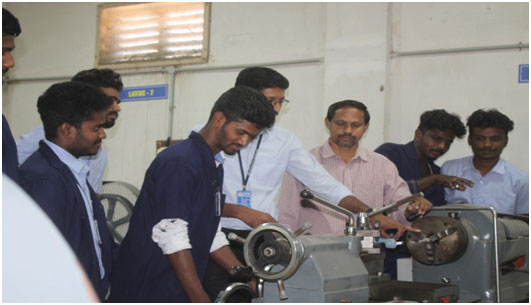
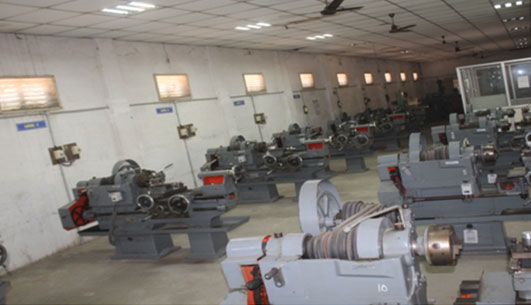
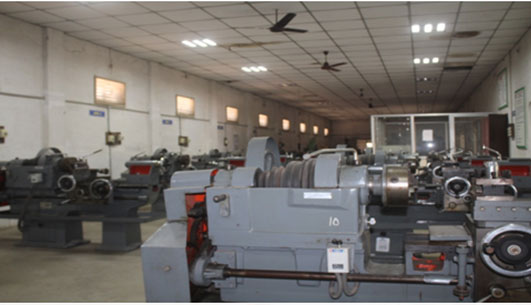
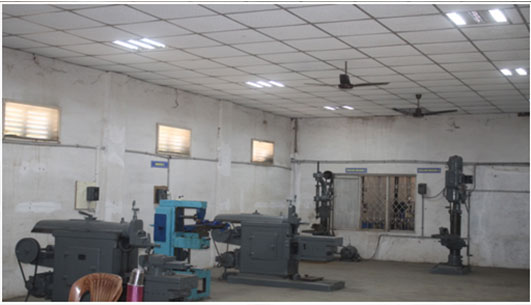
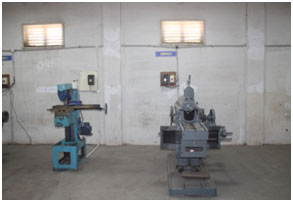
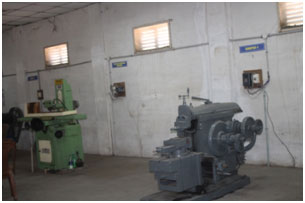
METALLURGY LAB
To impart practical exposure on the microstructures of various materials and their hardness evaluation. Also to impart practical knowledge on the evaluation of material properties through various destructive testing procedures.
In the contemporary World there has been continual demand of new materials in various engineering applications especially in aerospace, automobile and other industrial applications. To understand the requirement of industry there is a need to understand the behaviour of metals or alloys. The behaviour of materials can be studied well in Metallurgy lab by utilizing microscope. Students are exposed to sample preparation methods like polishing, etching and micro structural study of various phases and inclusion rating etc
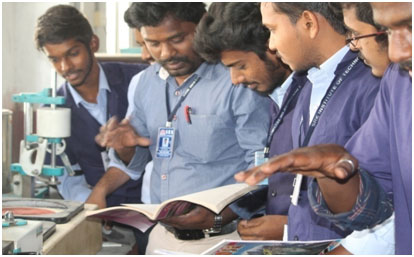
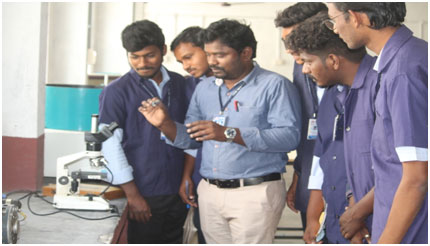
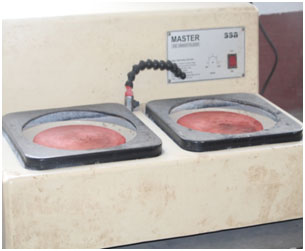
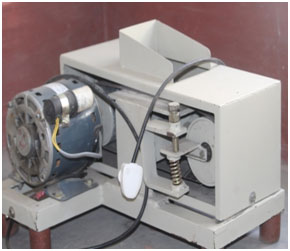
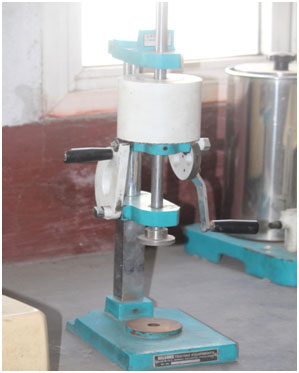
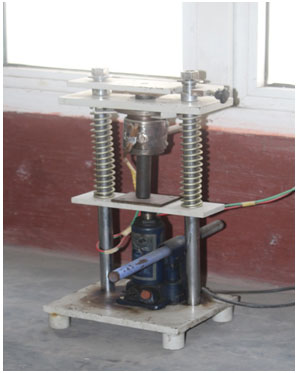
METROLOGY & INSTRUMENTATION LAB
The Metrology Lab is useful for engineering students to provide about different aspects of measurement. The measurement either linear or angular one is being dealt. Most often the measuring instruments losses their accuracy after a prolonged period of usage. This leads to error in measurement which further being supplemented with other errors. An over view of calibration has been dealt thoroughly and its importance is emphasized. Various types of instruments are being used and their accuracy has ascertained with the help of standards like slip blocks and sine bar. Surface roughness measurement and checking of tool angles one of the major feature of this laboratory.
The Metrology and instrumentation Laboratory course is designed for measuring and gauging instruments for inspection of precision linear, geometric forms, angular and surface finish measurements. The student can learn the measurements with and calibration of instruments. They also understand the machine tool alignment test. Instrumentation lab introduces the students with the theory and methods for conducting experimental work in the laboratory and calibration of various instruments for measuring pressure, temperature, displacement, speed, vibration etc.


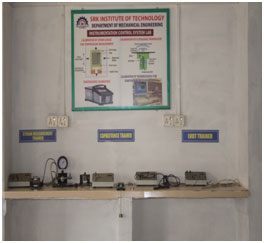
MECHATRONICS LAB
At the end of the course, the student will be able to:
1 Measure load, displacement and temperature using analogue and digital sensors.
2 Develop PLC programs for control of traffic lights, water level, lifts and conveyor belts.
3 Simulate and analyse PID controllers for a physical system using MATLAB.
4 Develop pneumatic and hydraulic circuits using Automaton studio
The overarching philosophy in mechatronics is that enhanced performance, flexibility, and reliability can be obtained in a product or process through the integration of mechanics and electronics under the control of software.
Because of the ubiquitous nature of mechatronics, the mechanical engineer must understand the fundamentals of mechanics, electronics, and software in order to be successful in today’s world. By and large, most undergraduate mechanical engineering programs do a good job teaching the fundamentals of mechanics, but fall short in giving students the necessary understanding of electronics, computer interfacing, and how these are integrated in product design and manufacture. The experiments described in this manual are an attempt to give the student a broad range of hands-on experiences to help build a solid foundation in analog and digital electronics, sensors and transducers, actuators, and microprocessor interfacing, so he or she can begin to function effectively as mechanical engineer in an increasingly mechatronic world.
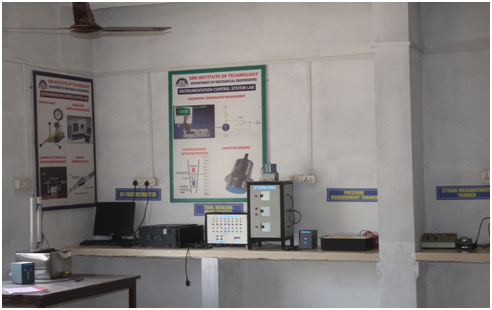
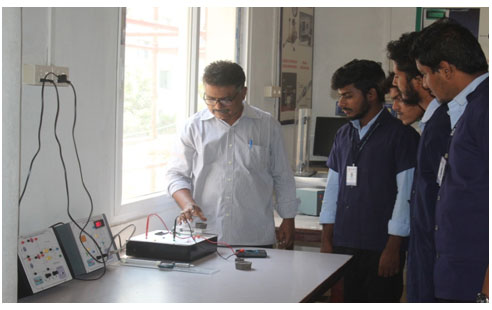
THERMAL ENGINEERING LAB
To provide hands on experience in operating various types of internal combustion engines and understand their functioning and performance
To provide the basic knowledge regarding the principles of working of various types of engines & to know about the properties and testing of fuels and to learn about various heat transfer , Thermal Engineering Equipment.
Thermal Sciences lab would provide sound theoretical as well as practical knowledge to students . In current scenario , it finds several applications to meet human needs and deeds. IC engines finds application in transport where as heat transfer principles are mandatory in all equipments. The Lab provides research facilities to test various types of engines, to test fuels and to built new principles in increasing the heat transfer rates
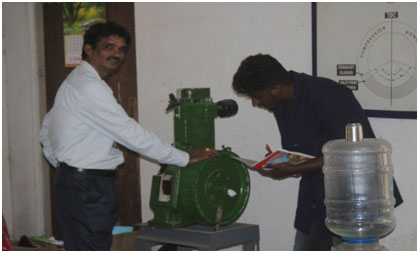
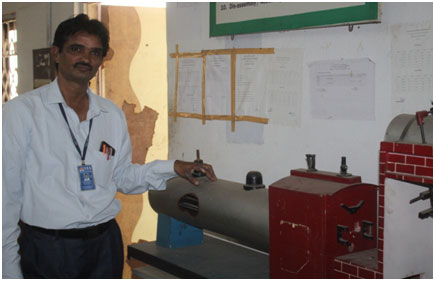
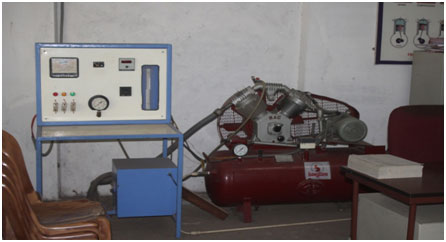
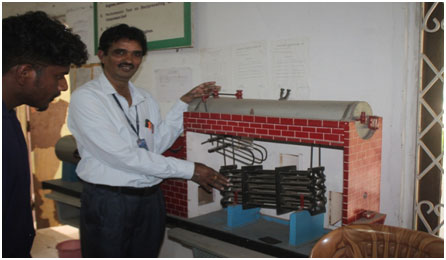
ENGINEERING WORKSHOP
To impart hands-on practice on basic engineering trades and skills..
Course Objectives: To acquire the hands on experience and skills for various turning operations, milling operations, welding, forging and black smithy methods
Course Outcome As an outcome of completing the Laboratory course, students will able to Enhancing the skills in machining operations like turning, milling, welding and blacksmithy
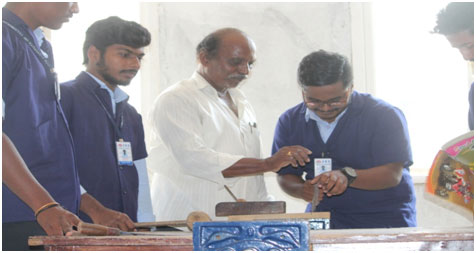
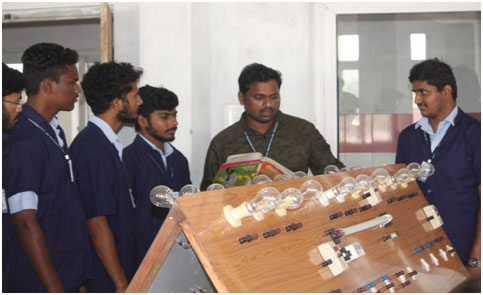
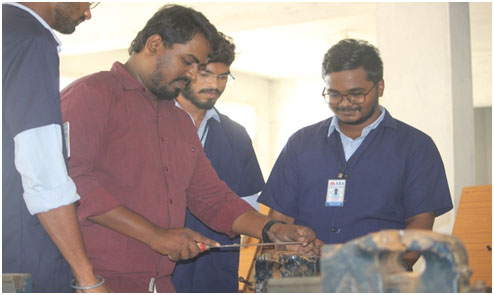
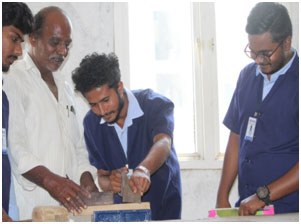
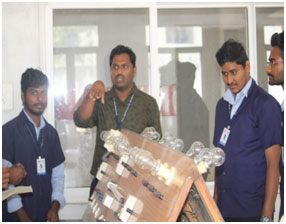
PRODUCTION TECHNOLOGY LAB
To impart hands-on practical exposure on manufacturing processes and equipment
To make the student to know Design and manufacture of simple patterns, Sand testing,Arc welding, gas welding and resistance welding equipment for the fabrication of welded joints, Pipe bending and injection molding equipment
Course Outcomes: The student will be able to Design and manufacture simple patterns Control sand properties in foundry Operate arc welding, gas welding and resistance welding equipment Use pipe bending and injection moulding equipment

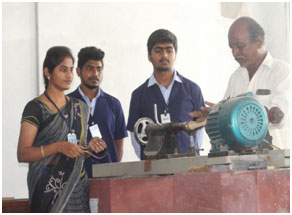
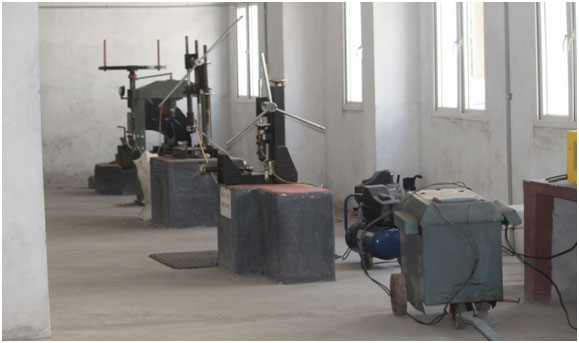
THEORY OF MACHINES LAB
1. To develop a solution oriented approach by in depth knowledge of Theory of Machines.
2. To address the underlying concepts, methods and application of different machines
Mechanisms form the basis of any machine and it is an assemblage of rigid bodies so that they move upon each other with definite relative motion. Objectives of this Theory of Machines lab is to impart practical knowledge on design and analysis of mechanisms for the specified type of motion in a machine. With the study of rigid bodies motions and forces for the transmission systems, machine kinematics and dynamics can be well understood

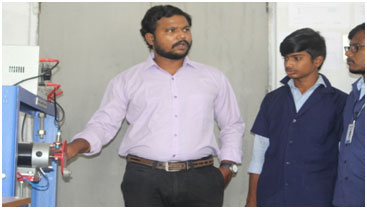
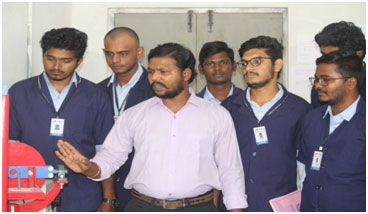
HEAT TRANSFER
This course is intended to impart knowledge of principles of heat transfer and analyze the heat exchange process in various modes for the evaluation of rate of heat transfer and the temperature distribution in different configurations.
The laboratory course is aimed to provide the practical exposure to the students with regard to the determination of amount of heat exchange in various modes of heat transfer including condensation & boiling for several geometries

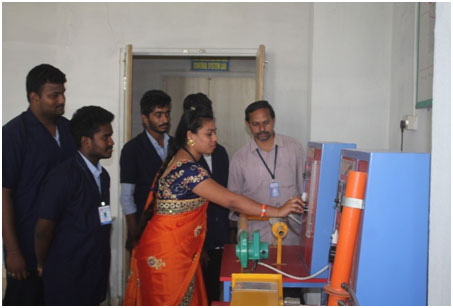

Skill Development centers
Applied Robot Control Lab
(APSSDC- ECM - Convergence training Center


The European Center for Mechatronics (ECM) and APSSDC have taken the initiative to create a mechatronics eco system in India that would meet industrial needs starting at the academic level. The programme is also supported by the Indo Euro synchronisation team, APS, GmbH, ITA, RWTH Aachen University, and German Center for Advanced Engineering Studies. In this context, the Government of Andhra Pradesh has established Applied Robot control (ARC) labs throughout the engineering institutions in Andhra Pradesh as part of a first-of-its-kind programme through APSSDC in conjunction with ECM Germany. SRK Institute of Technology has also become a part of this program and established ARC lab in the department of Mechanical Engineering.
Objectives
This is a first kind of MoU in with State of Andhra Pradesh to develop the skill of the students in the area of Automation and Industrial Robotics.Faculty members from the colleges who will be delivering this program to the students, will be given intensive training in Germany and through online workshops by experts from ECM and its partners.
Brining latest technologies in automation and manufacturing sectors to the labs of colleges
Firsthand experience on industrial robots for the students



Achievements
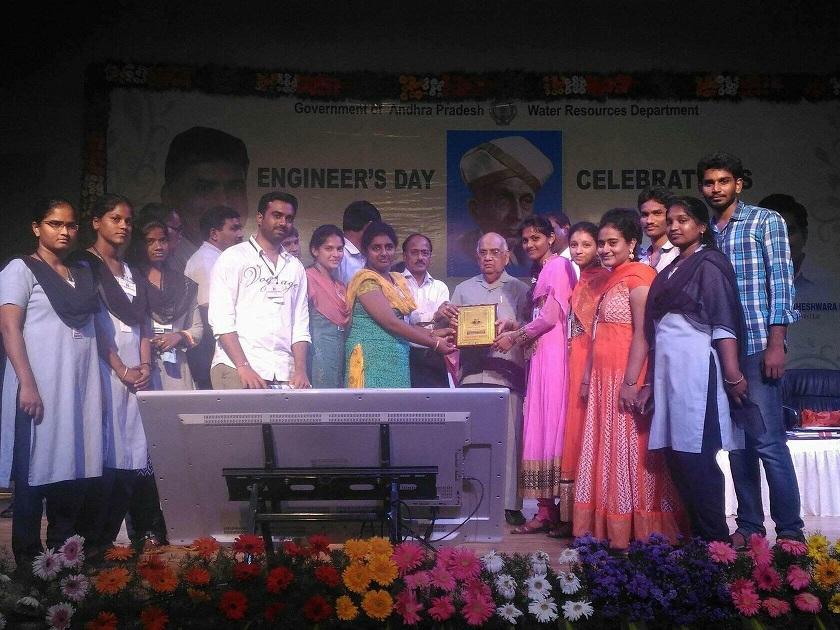
Department Activities
Civil Engineering Department has been conducting different activities for faculty and students such As Faculty Development Programs, Workshops, Seminars, Guest Lectures and Training programs on new technologies for the benefit of Civil Engineering students. Department also encourages the students to participate in different events such as paper presentations, poster presentations, model making, quizzes and cultural activities conducted by other colleges. Department of Civil Engineering also arranges Industrial Visits and field trips. Department made arrangements to send the students for internship programs to acquire Practical knowledge which is more useful for their carrier.
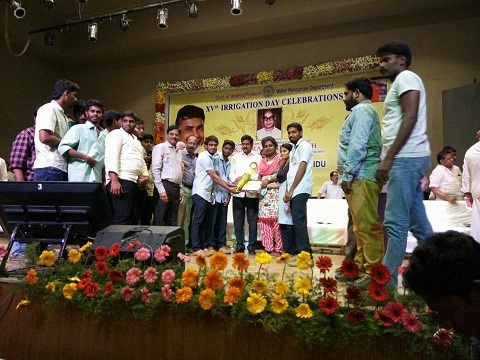
Projects
Get the latest SRKIT news and information about upcoming events on campus.

